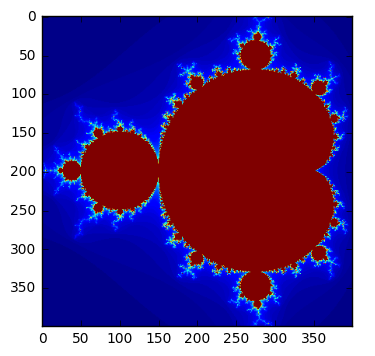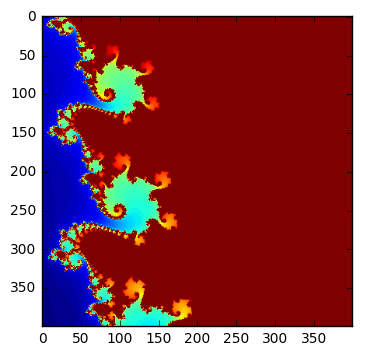Functions¶
import numpy as np
import matplotlib.pyplot as plt
%matplotlib inline
What’s wrong with this code?¶
max_iter = 100
h, w = 400, 400
img = np.zeros((h, w)).astype('int')
for i, real in enumerate(np.linspace(-1.5, 0.5, w)):
for j, imag in enumerate(np.linspace(-1, 1, h)):
c = complex(real, imag)
z = 0 + 0j
for k in range(max_iter):
z = z*z + c
if abs(z) > 2:
break
img[j, i] = k
plt.grid(False)
plt.imshow(img, cmap=plt.cm.jet)
pass

- hard to understand
- uses global variables
- not re-usable except by copy and paste
Refactoring to use functions¶
def mandel(c, z=0, max_iter=100):
for k in range(max_iter):
z = z*z + c
if abs(z) > 2:
return k
return k
def mandelbrot(w, h, xl=-1.5, xu=0.5, yl=-1, yu=1):
img = np.zeros((h, w)).astype('int')
for i, real in enumerate(np.linspace(xl, xu, w)):
for j, imag in enumerate(np.linspace(yl, yu, h)):
c = complex(real, imag)
img[j, i] = mandel(c)
return img
img = mandelbrot(w=400, h=400)
plt.grid(False)
plt.imshow(img, cmap=plt.cm.jet)
pass

Function is re-usable¶
img = mandelbrot(w=400, h=400, xl=-0.75, xu=-0.73, yl=0.1, yu=0.12)
plt.grid(False)
plt.imshow(img, cmap=plt.cm.jet)
pass

Anonymous functions (lambdas)¶
def square(x):
return x*x
square(3)
9
square2 = lambda x: x*x
square2(3)
9
First class functions¶
# functions can be treated the same way as (say) an integer
Functions can be passed in as arguments¶
def grad(x, f, h=0.01):
return (f(x+h) - f(x-h))/(2*h)
def f(x):
return 3*x**2 + 5*x + 3
grad(0, f)
5.000000000000004
Functions can also be returned by functions¶
import time
def timer(f):
def g(*args, **kwargs):
start = time.time()
result = f(*args, **kwargs)
elapsed = time.time() - start
return result, elapsed
return g
def f(n=1000000):
s = sum([x*x for x in range(n)])
return s
timed_func = timer(f)
timed_func()
(333332833333500000, 0.18930506706237793)
Decorators¶
@timer
def g(n=1000000):
s = sum([x*x for x in range(n)])
return s
g()
(333332833333500000, 0.192213773727417)
Map, filter, reduce¶
map(lambda x: x*x, [1,2,3,4])
<map at 0x10996d5c0>
list(map(lambda x: x*x, [1,2,3,4]))
[1, 4, 9, 16]
list(filter(lambda x: x%2==0, [1,2,3,4]))
[2, 4]
from functools import reduce
reduce(lambda x, y: x*y, [1,2,3,4], 10)
240
List comprehension¶
[x*x for x in [1,2,3,4]]
[1, 4, 9, 16]
[x for x in [1,2,3,4] if x%2 == 0]
[2, 4]
Set and dictionary comprehension¶
{i%3 for i in range(10)}
{0, 1, 2}
{i: i%3 for i in range(10)}
{0: 0, 1: 1, 2: 2, 3: 0, 4: 1, 5: 2, 6: 0, 7: 1, 8: 2, 9: 0}
Generator expressions¶
(i**2 for i in range(10,15))
<generator object <genexpr> at 0x109e5ca40>
for x in (i**2 for i in range(10,15)):
print(x)
100
121
144
169
196
Generator expressions¶
Generator expressions return a potentially infinite stream, but one at a time thus sparing memory. They are ubiquitous in Python 3, allowing us to handle arbitrarily large data sets.
# Note that count can generate an infinite stream
def count(i=0):
while True:
yield i
i += 1
c = count()
next(c)
0
next(c)
1
next(c)
2
list(zip('abcde', count(10)))
[('a', 10), ('b', 11), ('c', 12), ('d', 13), ('e', 14)]
for i in count():
print(i)
if i >= 10:
break
0
1
2
3
4
5
6
7
8
9
10
def palindrome_numbers(n):
yield from range(1, n+1)
yield from range(n, 0, -1)
list(palindrome_numbers(5))
[1, 2, 3, 4, 5, 5, 4, 3, 2, 1]
Itertools¶
import itertools as it
for i in it.islice(count(), 5, 10):
print(i)
5
6
7
8
9
for i in it.takewhile(lambda i: i< 5, count()):
print(i)
0
1
2
3
4
import operator as op
[i for i in it.starmap(op.add, [(1,2), (2,3), (3,4)])]
[3, 5, 7]
fruits = ['appple', 'banana', 'cherry', 'durain', 'eggplant', 'fig']
for k, group in it.groupby(sorted(fruits, key=len), len):
print(k, list(group))
3 ['fig']
6 ['appple', 'banana', 'cherry', 'durain']
8 ['eggplant']
Functools¶
import functools as fn
rng1 = fn.partial(np.random.normal, 2, .3)
rng2 = fn.partial(np.random.normal, 10, 1)
rng1(10)
array([ 2.13849718, 1.5807533 , 1.92939089, 2.32091577, 1.75429334,
2.39892103, 2.13631947, 1.90810476, 1.54398362, 2.22273936])
rng2(10)
array([ 9.46427924, 10.75766948, 9.79962611, 10.46099347,
10.44005324, 9.69270764, 8.788236 , 10.32903729,
8.98723117, 9.97326292])
fn.reduce(op.add, rng2(10))
95.284222396568097
Modules¶
import numpy as np
import pandas as pd
import matplotlib.pyplot as plt
from pandas import DataFrame, Series
import scipy.stats as ss
DataFrame(ss.beta(2,5).rvs((3,4)), columns=['a', 'b', 'c', 'd'])
| a | b | c | d | |
|---|---|---|---|---|
| 0 | 0.128479 | 0.285557 | 0.380817 | 0.223367 |
| 1 | 0.391506 | 0.282001 | 0.231474 | 0.196180 |
| 2 | 0.567670 | 0.122379 | 0.278288 | 0.151692 |
Where does Python search for modules?¶
import sys
sys.path
['',
'/Users/cliburn/anaconda2/envs/p3/lib/python3.5/site-packages/StreamLib-1.0.1-py3.5.egg',
'/Users/cliburn/anaconda2/envs/p3/lib/python3.5/site-packages/julia-0.1.1-py3.5.egg',
'/Users/cliburn/anaconda2/envs/p3/lib/python3.5/site-packages/pybind11-1.9.dev0-py3.5.egg',
'/Users/cliburn/anaconda2/envs/p3/lib/python3.5/site-packages/scikits.odes-2.3.0.dev0-py3.5-macosx-10.6-x86_64.egg',
'/Users/cliburn/anaconda2/envs/p3/lib/python3.5/site-packages/ReFlowRESTClient-0.4-py3.5.egg',
'/Users/cliburn/spark/python',
'/Users/cliburn/git-teach/sta-663-2017-public/notebook',
'/Users/cliburn/anaconda2/envs/p3/lib/python35.zip',
'/Users/cliburn/anaconda2/envs/p3/lib/python3.5',
'/Users/cliburn/anaconda2/envs/p3/lib/python3.5/plat-darwin',
'/Users/cliburn/anaconda2/envs/p3/lib/python3.5/lib-dynload',
'/Users/cliburn/.local/lib/python3.5/site-packages',
'/Users/cliburn/anaconda2/envs/p3/lib/python3.5/site-packages',
'/Users/cliburn/anaconda2/envs/p3/lib/python3.5/site-packages/Sphinx-1.4.1-py3.5.egg',
'/Users/cliburn/anaconda2/envs/p3/lib/python3.5/site-packages/aeosa',
'/Users/cliburn/anaconda2/envs/p3/lib/python3.5/site-packages/IPython/extensions',
'/Users/cliburn/.ipython']
Creating your own module¶
%%file my_module.py
PI = 3.14
def my_f(x):
return PI*x
Overwriting my_module.py
import my_module as mm
mm.PI
3.14
mm.my_f(2)
6.28
from my_module import PI
PI * 2 * 2
12.56
Note: Modules can also be nested within each other - e.g.
numpy.random to creaate a package. We will explore how to create
packages in a later session.